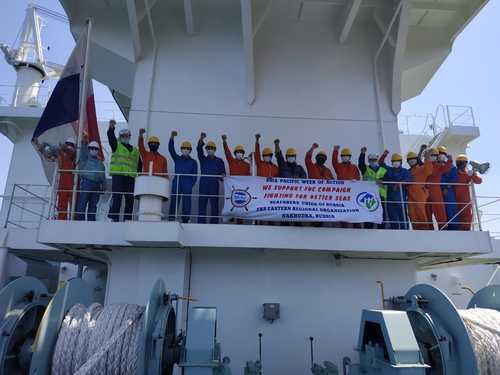ÐÎÑÑÈÉÑÊÈÉ ÏÐÎÔÅÑÑÈÎÍÀËÜÍÛÉ ÑÎÞÇ ÌÎÐßÊÎÂ
SEAFARERS' UNION OF RUSSIA
A NON-UNIONIZED SEAFARER
IS AN UNPROTECTED SEAFARER
Back
Japanese shipowner saves on seafarers ' salaries

When visiting the m/v Orient Gulf II, which was under loading at the coal terminal of the Vostochny port, the inspectors of the Far Eastern territorial organization of the Seafarers Union of Russia found out that the vessel is not covered by the ITF collective agreement and contracts of employment were signed for a period of 10 months. The base rate of an AB is 618 US dollars – lower than the recommended rate of 641 US dollars by the ILO. And the amount of insurance cover in the event of the death of a seafarer does not meet the requirements of the ITF.
Orient Gulf II (flag of Panama, IMO 9873967, dwt 19997, built in 2019) arrived from the Korean port of Pohang and after loading will proceed to the Japanese port of Yokkaichi. The actual shipowner who signed the Declaration Part II of the MLC 2006 and pays wages to seafarers is the Japanese company Todo Ship Co. Ltd, the operator company (ISM Manager) is Todo Kisen KK, informed Nikolay Sukhanov, chairman of the FETO SUR. The crew, consisting entirely of Filipino seafarers, warmly welcomed the representatives of the Seafarers Union of Russia, the captain provided all the documents, from which it is clear that the seafarers were manned through the state crewing in the Philippines in Manila. The captain's salary is 6200 US dollars, meals are organized for 7.5 US dollars per day for each crewmember. The captain suggested that the representatives of the trade union have lunch and make sure of the quality of the food being prepared and a sufficient amount of fresh vegetables and fruits on board the vessel. At a meeting with the crew, trade union inspectors told why shipowners choose a convenient flag and what rights do seafarers working on such ships have: «After registering a vessel under a flag of convenience, many shipowners employ the cheapest labor they can find, pay them the minimum wage and reduce costs by using the lowest standards of working conditions and living conditions of the crew on board. Globalization only contributes to this fall to the bottom. Due to the fierce competition existing in the shipping market, each new flag of convenience register offers an increasingly lower registration fee and minimal regulation. In the same way, in order to withstand competition, shipowners are forced to look for the cheapest and least regulated ways to operate their vessels, and flags of convenience provide them with such opportunities.» Representatives of the FETO SUR answered all the urgent questions of the crewmembers, who in turn asked to send a notice of warning to the shipowner with a demand to sign a collective agreement with the Japanese Seafarers ' Union. «Taking into account the fact that according to the ITF coordinator of Japan Fusao Ohori, the company avoids meetings with trade unions and delays the negotiation process in every possible way, we suggested that the seafarers hold an action against flags of convenience on the stern of the ship and transmit the seafarers' demand to the company, and also send information about the inspection to the President of the Philippine seafarers union Conrad Oka», – Nikolay Sukhanov told us. The seafarers were given the Maritime Union Herald and books on the rights of seafarers working on ships under convenient flags.
Up
